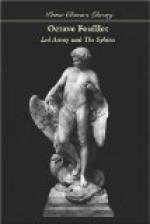Ah! I wish to think now only of my approaching meeting with you, the day after to-morrow, dear friend, and perhaps before this letter—
* * * * *
Come, Paul! If you can leave your mother, come, I beseech you, come to uphold me. God’s hand is upon me!
I was writing that interrupted line when, in the midst of the confused noises of the tempest, I fancied I heard the sound of a voice, of a human groan. I rushed to my window; I leaned outside to pierce the darkness, and I discovered lying upon the drenched soil a vague form, something like a white bundle. At the same time, a more distinct moan rose up to me. A gleam of the terrible truth flashed through my brain like a keen blade. I groped through the darkness as far as the door of the mill; near the threshold, stood a horse bearing a side-saddle. I ran madly around to the other side of the ruins, and within the inclosure situated beneath the window of my cell, and which still retains some traces of the former cemetery of the monks, I found the unhappy creature. She was there, sitting on an old tomb-stone, as if overwhelmed, shivering in all her limbs under the chilling torrent of rain which a pitiless sky was pouring without interruption over her light party-dress. I seized her two hands, trying to raise her up.
“Ah! unhappy child! what have you done!”
“Yes, most unhappy!” she murmured, in a voice as faint as a breath.
“But you are killing yourself.”
“So much the better—so much the better!”
“You cannot remain there! Come!—”
I saw that she was unable to stand up alone.
“Ah! Dieu bon! Dieu puissant! what shall I do? What’s to become of you now? What do you wish with me?”
She made no reply. She was trembling, and her teeth were chattering. I lifted her up in my arms and I carried her in. The mind works fast in such moments. No conceivable means of removing her from this valley where carriages cannot penetrate; nothing was henceforth possible to save her honor; I must only think of her life. I scaled rapidly the steps leading to my cell, and I seated her on a chair in front of the chimney in which I hastily kindled a fire; then I woke up my hosts. I gave to the miller’s wife a vague and confused explanation. I know not how much of it she understood; but she is a woman, she took pity and went on bestowing upon Madame de Palme such care as was in her power. Her husband started at once on horseback, carrying to Madame de Malouet the following note from me:
“MADAM:—She is here, dying. In the name of the God of mercy, I beseech you, I implore you—come to console, come to bless her who can no longer expect words of kindness and forgiveness from any one but you in this world.
“Pray tell Madame de Pontbrian whatever you think proper.”
She was calling me. I returned to her side. I found her still seated before the fire. She had refused to be put into the bed that had been prepared for her. When she saw me—singular womanly preoccupation!—her first thought was for the coarse peasant’s dress she had just exchanged for her own water-soaked and mud-stained garments. She laughed as she called my attention to it; but her laughter soon turned into convulsions which I had much difficulty in quieting.




